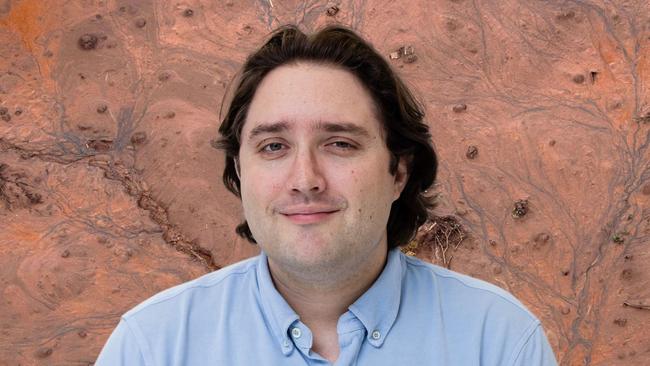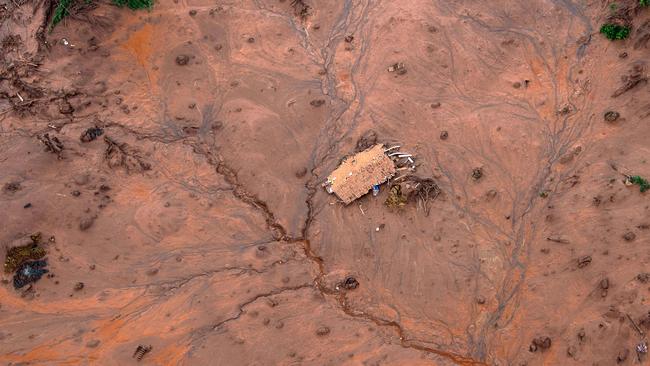Class action lawyer Tom Goodhead plans legal cases on behalf of Indigenous communities
The London lawyer spearheading a huge class action against BHP says he will fight for Indigenous Australians’ cultural heritage as he plans to triple staffing in his new Sydney office.

The lawyer spearheading a $70bn class action against mining giant BHP says he will fight for Indigenous Australians whose “cultural heritage is being destroyed” by corporate interests, as he moves to triple the headcount of his new Sydney offices by the end of the year.
Founder of London firm Pogust Goodhead, Tom Goodhead, told The Australian he is “unashamed” of making money out of Australia’s class action market, dismissing “bullshit” criticism that international firms and litigation funders are capitalising on Australia’s lax regulation and bankrupting big businesses.
He is set to launch dozens of cases out of his newly established Phillip Street headquarters, with one key focus on Aboriginal and environmental matters, having met with the Environmental Defenders Office and Australian Conservation Fund in recent trips.
Mr Goodhead is preparing for a liability trial against BHP in a London court from Monday, representing more than 650,000 claimants who were impacted by the collapse of Brazil’s Fundão tailings dam – near Mariana, in Minas Gerais province – which caused a mudslide that killed 19 people, destroyed nearby villages and devastated the Rio Doce river basin.
However, the matter has not come without its hurdles, with a possible $8bn hole being blown through the case just days before it is set to be heard.

Travelling with two claimants ahead of the trial, touted to be one of the biggest class actions in history, Mr Goodhead told The Australian victims of the dam collapse had been suffering for years because the river served as a god to them, as well as a key food and water resource.
“They’ve had to change their diet because they are no longer able to be fishing from the river or raising their own cattle safely, so they’re now eating processed food,” said Mr Goodhead, speaking about the community of one of the claimants.
“They worshipped the river as a river god. The claim that his community are making is one in relation to – as well as loss of livelihoods and changes to their life patterns – damage to their cultural traditions.”
London-based Mr Goodhead has met Aboriginal groups on trips to Australia, and is eager to translate the work he has done overseas to service the “unmet needs” of the local market.
“I’m cognisant, obviously, of the history of those communities, having (had) the privilege of working with Indigenous communities in Brazil as well as Peru in a number of different cases,” he said. “That’s just something I enjoy, frankly. Personally I derive a huge amount of satisfaction from (the work).”
He has also taken meetings with the EDO, and said he looked forward to “collaborating with groups like that in the future”.
The EDO, which again began receiving money from Labor last year after a 10-year funding drought initiated by the Abbott government, is conducting cases in the Federal Court – including one involving Woodside’s $16.5bn Scarborough offshore gas field.
Australia’s class action market has come under scrutiny in recent months, with conservative think tanks and Coalition MPs saying it has become a hotbed for global litigation funders looking to make a quick buck due to thin regulation.
The nation’s litigation funding market has quadrupled to more than $200m, according to research from the Menzies Research Centre, with Australia becoming the second-largest forum for class action suits, behind only the US.
Mr Goodhead is “unashamed” about making money from the work, saying he aims to build an Australian team of seven by the end of the year to take on at least three matters already in the pipeline – likely against BHP and car manufacturers.
“Obviously there’s a huge burgeoning class action market in Australia with lots of existing incumbents,” he said, saying he is confused as to why some people get “very upset” at the prospect of firms bankrupting big businesses through group litigation.
“Generally what I say is ‘don’t do bad things’,” he said. “If you don’t do bad things, you don’t get sued. That tends to be a general rule.”
He dismissed as “nonsense” claims that class action firms are “bad guys” for wanting to pay their lawyers well or hold big businesses to account.
“I’m completely unashamed about that, frankly. If they’re allowed to make money out of mining, I don’t see why we’re not able to … operate what is a business for us,” he said.
“I take – the same way anybody else does – capital at a certain cost of capital and then I have to go make a return for investors out of it. It happens to be the business … I’ve chosen to do that in is law rather than mining.”
Menzies Research Centre chief executive David Hughes said “one of the reasons” global litigation funders and class action firms might choose to set up shop in Australia “is because we have a low bar to launch class actions, and the share funders and firms get from settlements is pretty high in Australia”.
“The fact that Australia is leading the world in class actions isn’t because our businesses are breaking laws at a greater rate than those overseas,” he said.
Proceedings in the UK action are set to begin on Monday, but earlier this week Brazil’s highest court, the Supreme Federal Court, ordered 46 Brazilian municipalities that are party to Pogust Goodhead’s British claim to hand over their funding contracts with the firm.
The court also issued an injunction on any victory payments from the municipalities to the firm, whose stake in the claim could be up to $8bn.
“BHP have tried every procedural tactic to obstruct and intimidate to avoid being held to account,” Mr Goodhead said. “This won’t dissuade us in the least in our efforts to achieve justice for victims of this disaster.”
The injunction comes as the Brazilian government prepares to finalise a $34bn settlement with BHP over the disaster, potentially by the end of the week.
The settlement could create a separate source of compensation for some claimants, which could disqualify them from the UK action.
Mr Goodhead said while some claimants might be “absolutely desperate” to take up the Brazilian settlement, he is confident others just “want their day in court”.
“All I’ve ever wanted to see is the right outcome for clients, and if this means things get resolved for a good number of our clients in Brazil through appropriate mechanisms then that’s only a good outcome, right?” he said.
He said he reserves the right to sue BHP for his legal fees.
“If I have to sue BHP again in the court to get paid for the work that we’ve done because they’re settling with people directly in Brazil, then that’s something I’m quite prepared to do,” he said. “I just want to see a right outcome for the clients.”
A BHP spokesperson said the company’s Brazilian branch was working with “authorities and others to seek solutions to finalise a fair and comprehensive compensation and rehabilitation process that would keep funds in Brazil for the Brazilian people and environment affected, including impacted Indigenous communities”.
“BHP continues to defend the legal action in the UK. We believe that the UK litigation, which, if successful, would not see claimants receive payment until 2028 at the earliest, duplicates – and harms – local remedial efforts in Brazil,” the spokesperson said.






To join the conversation, please log in. Don't have an account? Register
Join the conversation, you are commenting as Logout